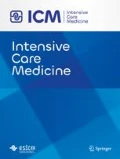Abstract
Aspergillus infections are among the most feared opportunistic infections in humans. These organisms are ubiquitous in nature; protection against infection is usually provided by anatomical barriers and by the immune system. Tissue invasion by Aspergillus is uncommon, occurring primarily in the setting of immunosuppression. The prognosis of invasive aspergillosis is very poor. Although it is widely recognised that critically ill patients in the Intensive Care Unit (ICU) are at risk for nosocomial infections, it is not generally appreciated that such patients may also be at risk for opportunistic infections usually seen only in immunocompromised patients. This might be explained by a biphasic immunological pattern during sepsis: an early hyperinflammatory phase followed by an anti-inflammatory response, leading to a hypo-inflammatory state, the so-called compensatory anti-inflammatory response syndrome (CARS or immunoparalysis). We describe four patients admitted to our ICU for various reasons, without a history of abnormal immune function, who developed invasive pulmonary aspergillosis. We hypothesise that the occurrence of these opportunistic infections in our patients may have been due to immunoparalysis, and that perhaps all ICU patients with sepsis and multiple organ dysfunction syndrome (MODS) may be at risk for opportunistic infections such as aspergillosis as a result of this syndrome. Physicians treating critically ill patients in the ICU should be aware of the CARS/immunoparalysis syndrome and its potential to cause opportunistic infections, even in patients with normal immune function prior to ICU admission.


Similar content being viewed by others
References
Maertens J, Vrebos M, Boogaerts M (2001) Assessing risk factors for systemic fungal infections. Eur J Cancer Care 10:56–62
Janssen JJ, Strack van Schijndel RJ, van der Poest Clement EH, Ossenkoppele GJ, Thijs LG, Huijgens PC (1996) Outcome of ICU treatment in invasive aspergillosis. Intensive Care Med 22:1315–1322
Denning DW, Stevens DA (1990) Antifungal and surgical treatment of invasive aspergillosis: review of 2121 published cases. Rev Infect Dis 12:1147
Sarel R (1991) Candida and Aspergillus infections in immunocompromised patients: an overview. Rev Infect Dis 13:487–492
Andriole VT (1996) Aspergillus infections: problems in diagnosis and treatment. Infect Agents Dis 5:47
Robinson LA (1999) Aspergillus and other fungi. Chest Surg Clin N Am 9:193–225
Bone RC (1991) The pathogenesis of sepsis. Ann Intern Med 115:457–469
Matsushima K, Oppenheim JJ (1989) Novel inflammatory cytokines inducible by IL-1 and TNF. Cytokine 1:2–13
Volk HD, Reinke P, Döcke WD (2000) Clinical aspects: from systemic inflammation to 'immunoparalysis'. Chem Immunol 74:162–177
Bone RC (1996) Sir Isaac Newton, sepsis, SIRS, and CARS. Crit Care Med 24:1125–1128
Kox WJ, Bone RC, Krausch D, Döcke WD, Kox SN, Wauer H, Egerer K, Querner S, Asadullah K, van Baehr R, Volk HD (1997) Interferon gamma-1b in the treatment of compensatory anti inflammatory response syndrome. A new approach: proof of principle. Arch Intern Med 157:389–393
Kox WJ, Volk T, Kox SN, Volk HD (2000) Immunomodulatory therapies in sepsis. Intensive Care Med 26: S124-S128
Adrie C, Pinsky MR (2000) The inflammatory balance in human sepsis. Intensive Care Med 26:364–375
Iwen PC, Davis JC, Reed EC, Winfield BA, Hinrichs SH (1994) Airborne fungal spore monitoring in a protective environment during hospital construction, and correlation with an outbreak of invasive aspergillosis. Infect Control Hosp Epidemiol 15:303–306
Oren I, Haddad N, Finkelstein R, Rowe JM (2001) Invasive pulmonary aspergillosis in neutropenic patients during hospital construction: before and after chemoprophylaxis and institution of HEPA filters. Am J Hematol 66:257–262
Pegues DA, Lasker BA, McNeil MM, Hamm PM, Lundal JL, Kubak BM (2002) Cluster of cases of invasive aspergillosis in a transplant intensive care unit: evidence of person-to-person airborne transmission. Clin Infect Dis 34:412–416
Pittet D, Huguenin T, Dharan S, Sztajzel-Boissard J, Ducel G, Thorens JB, Auckenthaler R, Chevrolet JC (1996) Unusual cause of lethal pulmonary aspergillosis in patients with chronic obstructive pulmonary disease. Am J Respir Crit Care Med 154:541–544
Rello J, Esandi ME, Mariscal D, Gallego M, Domingo C, Valles J (1998) Invasive pulmonary aspergillosis in patients with chronic obstructive pulmonary disease: report of eight cases and review. Clin Infect Dis 26:1473–1475
Vazquez JA, Sobel JD (1995) Fungal infections in diabetes. Infect Dis Clin North Am 9:97–116
Thommi G, Bell G, Liu J, Nugent K (1991) Spectrum of invasive pulmonary aspergillosis in immunocompetent patients with chronic obstructive pulmonary disease. South Med J 84:828–831
Polderman KH, Girbes ARJ (2002) Central venous catheter use, part 2: infectious complications. Intensive Care Med 28:18–28
Author information
Authors and Affiliations
Corresponding author
Rights and permissions
About this article
Cite this article
Hartemink, K.J., Paul, M.A., Spijkstra, J.J. et al. Immunoparalysis as a cause for invasive aspergillosis?. Intensive Care Med 29, 2068–2071 (2003). https://doi.org/10.1007/s00134-003-1778-z
Received:
Accepted:
Published:
Issue Date:
DOI: https://doi.org/10.1007/s00134-003-1778-z




